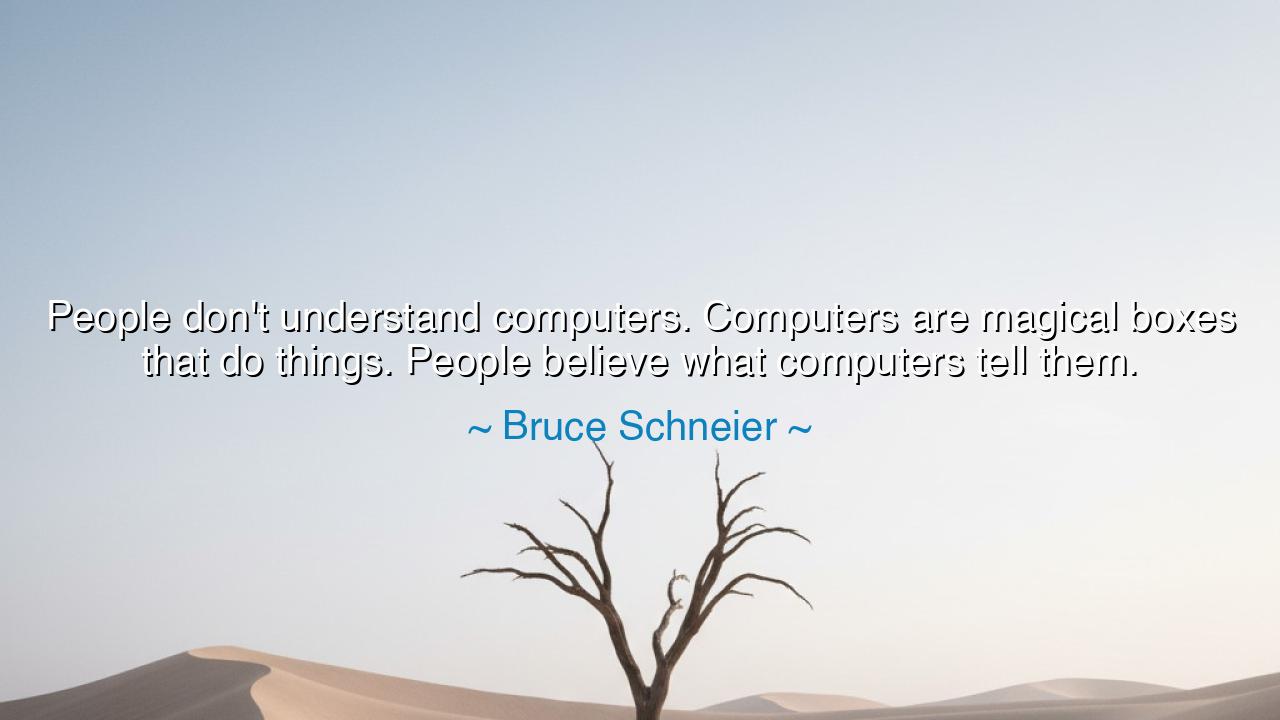
People don't understand computers. Computers are magical boxes
People don't understand computers. Computers are magical boxes that do things. People believe what computers tell them.






"People don't understand computers. Computers are magical boxes that do things. People believe what computers tell them." These words, spoken by Bruce Schneier, reflect a profound truth about technology and human perception. In the modern age, we have allowed computers—these complex, seemingly mystical devices—to shape much of our lives, often without fully understanding the processes that drive them. Schneier’s quote touches upon the mystification of technology, highlighting how computers have become like magical boxes that perform tasks with an unseen, often incomprehensible, set of operations. We trust them implicitly, without recognizing the limitations or potential dangers that may lie hidden beneath the surface.
In the ancient world, the concept of magic was often tied to the unknown forces of nature. In early civilizations, priests or shamans were the custodians of knowledge, possessing the ability to control or communicate with the invisible forces of the world. People did not understand the natural world—why the sun rose or how the seasons changed—so they turned to those who could offer explanations, whether rooted in the mystical or the divine. In a sense, early civilizations saw their world as governed by unseen forces—much like we view the operations of computers today. The mystery behind how technology functions and the trust we place in it parallels the ancient faith in magic or the divine to explain the unexplainable.
Take the example of Archimedes, the great Greek philosopher and mathematician, who revolutionized the understanding of physics. Archimedes famously exclaimed, "Give me a place to stand, and with a lever, I will move the world." While Archimedes understood the principles of mechanics, his discoveries often relied on intuitive insights and physical experiments. At the time, many of his ideas might have seemed as mysterious or magical to the common people as modern technology does to us today. People could see the results—an object floating in water or a machine lifting a heavy load—but did not necessarily grasp the underlying principles. In the same way, computers today perform incredible feats, yet many cannot comprehend how they work at their core. This lack of understanding creates a dangerous reliance on technology, as we blindly accept what these “magical boxes” tell us.
Consider, too, the rise of artificial intelligence in recent years. Just as ancient people revered prophecies and divination as mystical insights into the future, today, we place our faith in machines that process information far beyond human capability. For example, we turn to AI-driven systems for decision-making, from financial markets to criminal justice, often without fully understanding how they arrive at their conclusions. The results of these computations may seem infallible, yet they are far from it, influenced by the biases, algorithms, and data sets on which they are built. Schneier’s words serve as a reminder that our trust in computers should not be blind. Like the ancient mystics who foretold the future, computers often wield a type of power that many of us do not fully comprehend, and yet we continue to place our trust in them.
In the medieval world, alchemy represented the pursuit of transforming ordinary substances into something greater, often symbolizing the mystical quest for wisdom. Alchemists, much like modern-day programmers, performed tasks that appeared to defy natural laws, creating substances that were revered for their seemingly magical qualities. However, despite their work appearing extraordinary, the alchemists did not fully understand the science behind their transformations. Similarly, modern computers can perform complex calculations, process vast amounts of data, and solve problems with seemingly magical speed—yet the true mechanics behind these feats are often a mystery to the general user. The trust we place in technology today mirrors the trust placed in mystics of the past: both are powerful, but understanding the foundations of their work is often lacking.
Schneier's observation urges us to reflect on the dangers of this mystification of technology. Just as the ancient philosophers cautioned against the blind pursuit of knowledge without understanding its roots, we must ask ourselves whether we have truly grasped the implications of our reliance on computers and artificial intelligence. Are we so caught up in the magic of technology that we forget to question the underlying systems that shape our world? As we move forward into an increasingly digitized world, it is vital that we maintain a balance between trust in technology and a critical examination of how it works. Blind faith in machines could lead to unintended consequences, and it is our responsibility to ensure that we understand the tools we are using.
The lesson from Schneier's words is one of awareness and vigilance. Computers are not magical; they are human creations, and they operate based on algorithms, data, and code—components that can be understood, questioned, and improved. We must strive to understand how they work, not just accept their results without scrutiny. Just as ancient philosophers and scientists sought to unlock the mysteries of nature through inquiry and reflection, so too must we engage in the study and examination of the technologies that now shape our world. In doing so, we not only empower ourselves, but we ensure that technology remains a tool for human progress, rather than a force that controls us without our understanding. The magic of computers can be real, but it should never come at the cost of knowledge and understanding. Let us embrace the future of technology with both trust and awareness, wielding its power wisely and responsibly.






AAdministratorAdministrator
Welcome, honored guests. Please leave a comment, we will respond soon